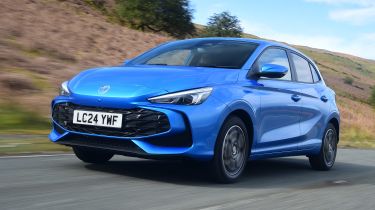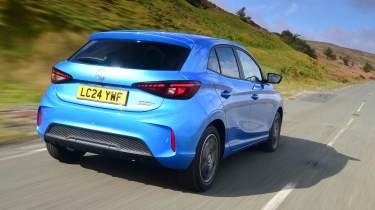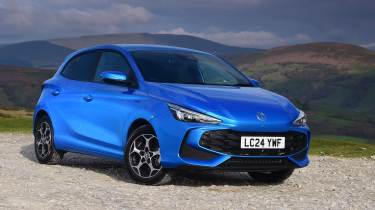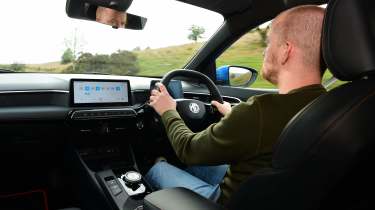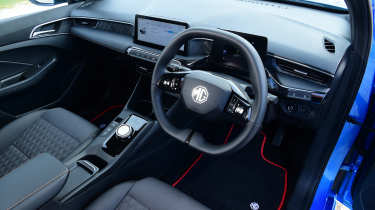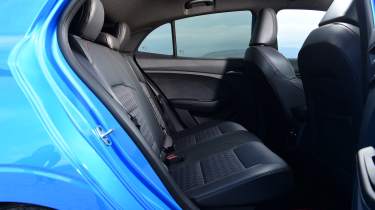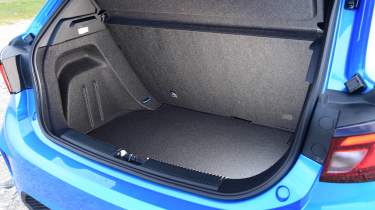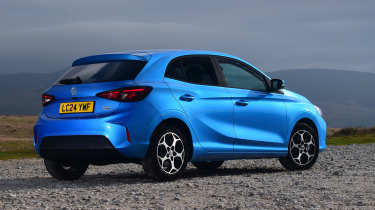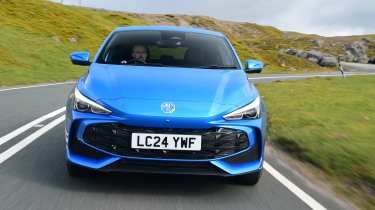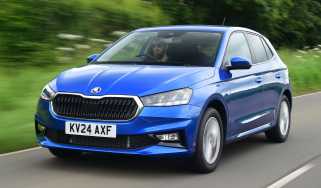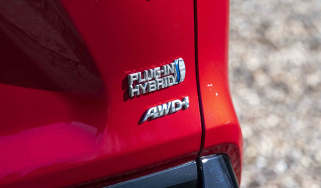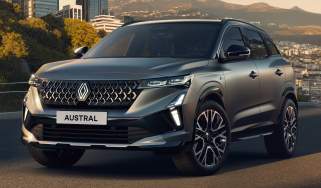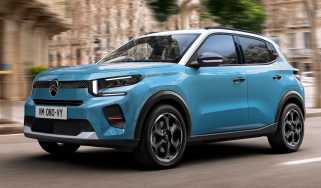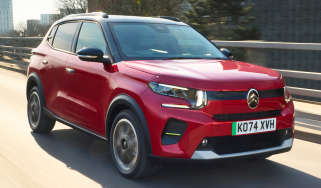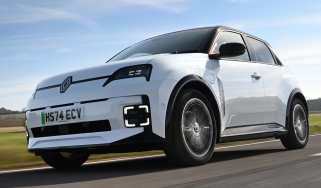MG3 review – affordable, efficient and fun-to-drive supermini
“The MG3 is something of a bargain, boasts an efficient hybrid powertrain and it’s good fun to boot”
Pros
- Punchy performance and fun to drive
- Efficient hybrid engine
- Very affordable
Cons
- Uninspiring interior
- Small boot
- Not suitable for taller drivers
Verdict – is the MG3 a good car?
Though its predecessor failed to make much of an impression, the latest MG3 represents a huge step forward. It features an efficient and punchy hybrid system and a well-equipped interior – not only that, it’s also quick and fun to drive, and you get all this for a very competitive price, winning it big points. This time the MG3 has made an impact, and should resonate with a wide spectrum of buyers looking for the best supermini. The only negatives are a somewhat lacklustre interior design, awkward driving position for taller drivers and MG’s poor customer satisfaction ratings, which this model can hopefully start to turn around.
MG3 models, specs and alternatives
While the first-generation MG3 was a pretty unremarkable supermini, the brand has made some big changes for the subsequent model. The most significant comes under the bonnet, where outdated petrol engines have been replaced with modern hybrid technology in the pursuit of better fuel economy.
The good news is that MG has stuck to its ethos of budget-friendly motoring despite the fancy hybrid tech, so it can still be had for a bargain sub-£18,500 price, making it one of the cheapest hybrids you can buy in the UK. For that price, you’ll be looking at rivals with mere mild-hybrid tech, like the Suzuki Swift, rather than the full-hybrid system you get here.
More reviews
If that wasn’t good enough value as is, MG announced in early 2025 that an even cheaper non-hybrid petrol model would join the line-up. It costs from around £16,500 and uses a 1.5-litre engine with 113bhp, though bear in mind that it won’t quite be as fuel-efficient as the Hybrid+, so could cost you more in the long run.
MG has kept the 3’s lineup basic, offering it in two trim levels from launch: SE and Trophy. As with the brand’s other cars, the MG3 aims to offer plenty for the money, and equipment like adaptive cruise control, lane keeping, parking sensors and a 10.25-inch infotainment display will leave many buyers wondering what the catch is.
Unlike the Toyota Yaris which is now offered with a choice of two hybrid options, the MG3 Hybrid+ gets just one. This is a 1.5-litre petrol engine and electric motor that work together to produce 192bhp – that’s a substantial figure that’s up there in hot-hatch territory, meaning the MG3 has an impressive amount of grunt.
Really, though, the focus with the hybrid system here is efficiency, and the MG3 delivers on that front. When we drove it, it returned over 60mpg around town where drivers will likely use it most, and over 50mpg on longer motorway runs for a roughly 55mpg combined average.
| Trim levels | Power options |
|
|
MPG, running costs & CO2 emissions
The old MG3 was a completely different car, and while it was cheap, the engine options were very simple and outdated. This time around the MG3 featured a modern fully-hybrid powertrain from launch, badged Hybrid+, so you can expect it to be cheap to run as well as cheap to buy.
The system is particularly efficient as it gets a larger 1.83kWh battery than those of other hybrid supermini rivals, so the MG3 runs like an EV for the majority of the time while its petrol engine acts as a generator to charge it. For added efficiency, the MG3 comes with regenerative braking which puts some of the force lost to braking back into the battery.
Diversifying its range a little more with an even lower starting price, MG later introduced a pure-petrol model using a 1.5-litre engine. It won’t be quite as efficient as the hybrid, though, so you can expect economy figures in the mid-40s, and in the long run that could cost you more than if you’d forked out for the initially-more-expensive Hybrid+.
The MG3 stacks up well in terms of efficiency alongside the Toyota Yaris, Mazda2 Hybrid and Renault Clio E-Tech hybrid superminis, achieving comparable figures yet with more power on offer when you need it, so it never feels like there’s too much of a trade-off between economy and performance.
| Model | Fuel economy | CO2 emissions |
| MG3 | 46.3mpg | 137g/km |
| MG3 Hybrid+ | 64mpg | 100g/km |
How efficient is the MG3 in the real world?
In the MG3 Hybrid+, we returned fuel economy of over 50mpg in the city and over 60mpg on the motorway, with a combined estimated figure of around 55mpg in our time with the MG3, so its lofty on-paper economy figure has some weight to it in the real world.
How much will the MG3 cost in tax?
As it’s a hybrid, the MG3 Hybrid+ will be taxed at a discounted rate compared to standard petrol superminis, and this equates to around £10 less annually, though it will cost the same as the MG3 petrol from April 2025. A low 100g/km CO2 emissions figure means the MG3 Hybrid+ will sit in a fairly low Benefit-in-Kind (BiK) tax band, so it will be cheaper to run as a company car. Bear in mind that fully-electric rivals like the Vauxhall Corsa Electric will be even cheaper to run for company-car buyers as they emit zero CO2, so it’s worth weighing up your options.
What will the MG3 cost to insure?
The MG3 sits in insurance groups 23-24 out of 50, which is a bit higher than rivals, most likely owing in part to the MG’s substantial power output. The Toyota Yaris and Renault Clio E-Tech sit in groups 13-14 and 15 respectively. It’s worth checking out a few insurance quotes before committing to buying an MG3, but we wouldn’t expect it to be very expensive to insure for most drivers.
Engines, drive & performance
The most surprising thing about the MG3 Hybrid+ is how good it feels to drive, despite being an unassuming budget-focused car. There’s no manual option for the hybrid version, but there is for the pure-petrol MG3 that was introduced later, and which we’re yet to drive. Because the Hybrid+ is auto-only, that at least means it will appeal to a wider range of drivers, and because it runs like an EV for a lot of the time, it feels smooth to drive, too.
The suspension setup has been tweaked by MG’s engineers in Longbridge, UK so it’s well-suited to UK roads, with a great balance between fun and comfort – it’s softer riding than other cars in its class, and it sports relatively small 16-inch alloys which – though they may look rather small – do a great job of ironing out the worst bumps on the road.
Thanks to MG’s British team, the MG3 is even capable of putting a smile on your face on our notoriously tricky B-roads – and that’s even comparing it to its excellent Renault Clio E-Tech and Toyota Yaris hybrid rivals. We thought they were fun to drive – even if they have fairly unimpressive performance figures – but the MG3 is agile, grippy and playful too, all the while inspiring a high level of confidence in its driver and boasting a higher power figure.
While the MG3 performs well in terms of its driving experience, it’s not completely perfect. We don’t like the large hexagon-shaped steering wheel – it’s hard to catch through your hands when cornering in more spirited driving on twisty roads, and some taller drivers will find its large size robs them of knee room even when adjusted to its highest position. The steering wheel can also only be raised or lowered, and it’s frustrating that there’s no telescopic reach adjustment – it seems strange to have omitted something like this in the pursuit of cost-saving in 2024.
Petrol models
Despite launching as a great-value hybrid-only hatchback, MG introduced a pure petrol version in March 2025 for around £2,000 less. It’s nowhere near as powerful, though, producing 113bhp from its 1.5-litre engine. It comes with a six-speed manual gearbox, but in all honesty – though we’re yet to drive it – it just doesn’t make much sense on paper given the Hybrid+ is more powerful, cleaner and not much more to buy.
Unlike its rivals, the Renault Clio E-Tech and Toyota Yaris, the MG3 Hybrid+’s powerful electric motor (producing 134bhp alone) means the car produces an impressive amount of poke off the line without the 1.5-litre petrol engine feeling strained. Those rivals’ engines can sound rather coarse when you accelerate hard, which has a bearing on refinement, but the combined output of the MG3’s petrol and electric motor is a hot-hatch-rivalling 192bhp, so it will be enough for keen drivers and casual drivers alike.
It might sound odd, but the gearbox consists of just three gears – that’s because the electric motor does most of the work most of the time. Put your foot down and there can be a noticeable delay between the petrol engine springing into life to deliver the full power figure, but it’s not any worse than the hybrid systems of rivals.
| Model | Power | 0-62mph | Top speed |
| MG3 1.5-litre petrol | 113bhp | 10.8 seconds | 115mph |
| MG3 1.5-litre Hybrid+ | 192bhp | 8 seconds | 106mph |
Interior & comfort
The outgoing MG3 and many of the brand’s past models have scored poorly for interior quality. This time, though, the latest MG3’s interior might look somewhat unremarkable against the class leaders, but importantly it’s a cut above its predecessor’s. There’s wider use of higher-quality materials in the areas that matter most, like on the armrests and steering wheel, but look closer and you’ll spot harder, less pleasing plastics.
There are airier models out there, too – the MG3 can feel a bit gloomy in part due to its narrow rear window and the dark colour of its upholstery.
Is the MG3’s infotainment and sat-nav system easy to use?
In our time with the MG3 we found the 10.25-inch infotainment system to be vibrant and responsive enough to use. Unfortunately, though, physical climate controls have been removed in favour of virtual controls through the touchscreen, which will make them harder to adjust on the move. We also found that, while we appreciate the abundance of information available on the instrument display, some of it is presented with small fonts that are hard to read while on the move.
Happily, the system comes with sat nav as standard, as well as features you’d expect of a more expensive car. We think the MG3 is well equipped because you get adaptive cruise control, lane keep assist, rear parking sensors and electric windows all round even on SE trim. Most buyers would be happy enough with that on a supermini, but for added convenience features there’s a second trim level above as with the MG4, dubbed Trophy, although this version is only available on the Hybrid+ version.
Key features | |
|
SE
|
Trophy (SE plus…)
|
Boot space, practicality & dimensions
One of the MG3’s weakest areas against other supermini rivals is practicality, and despite what you might expect, the petrol version’s boot is no bigger despite the fact the Hybrid+ needs to house an electric motor and battery as well. However, we’d say rear passenger space is at least average in the class, though if you plan on carrying adults in the back, you’d be better off with a Skoda Fabia.
| Size comparison | |||
| Model | Length | Width | Height |
| MG3 | 4,113mm | 1,797mm | 1,502mm |
| Skoda Fabia | 4,108mm | 1,780mm | 1,459mm |
| Renault Clio | 4,053mm | 1,798mm | 1,440mm |
| Toyota Yaris | 3,940mm | 1,745mm | 1,500mm |
Does the MG3 have a big boot?
Because of its hybrid system, the MG3’s boot lacks some space that could have otherwise been put towards boot capacity. At 293 litres its luggage space is fairly small for a supermini, and well behind that of the Skoda Fabia’s generous 380 litres. However, it’s at least on par with the boot sizes of its direct hybrid rivals, the Toyota Yaris and Renault Clio E-Tech. Because of the MG3’s good fuel economy and efficiency, you may consider the smaller boot a fair compromise if you don’t regularly transport large items. It’s a shame, however, that the petrol version sees no increase in boot space, despite the fact it does away with the electric motor and hybrid gubbins of the Hybrid+.
| Boot space comparison | |
| Model | Boot space |
| MG3 | 293 litres |
| Skoda Fabia | 380 litres |
| Renault Clio E-Tech | 301 litres |
| Toyota Yaris | 286 litres |
Reliability & safety
The MG3 could be a key model to turn around MG’s fortunes, because the brand found itself bottom of the manufacturer table in our 2023 and 2024 Driver Power survey. MG customers were unimpressed with overall build quality and their car’s infotainment setups – areas that both appear to have improved in the latest car. As it stands, 28.1% of MG owners reported a fault within the first year of ownership – down from 33% the year before.
At least owners should feel reassured by MG’s warranty, because it lasts for an impressive seven years/80,000 miles. So long as you aren’t a mega-mileage driver, this means it’s as long as Kia’s warranty for most owners, and only bettered by the likes of Toyota’s cover lasting up to 10 years, which comes with the caveat of having to stick with Toyota servicing.
How safe is the MG3?
While it hasn’t been crash-tested by Euro NCAP yet, the signs are positive that the MG3 should be a safe supermini. It’s fitted with a heap of safety features, most of which comes fitted as standard. For instance, even the SE trim gets adaptive cruise control, autonomous emergency braking (AEB) with pedestrian and cyclist detection, lane keep assist and drive attention alerts.
Step up to the Trophy model for £2k extra, and along with its other benefits, you’ll also get rear cross-traffic alert to help avoid dings when traversing car parks and backing out of driveways. It should also make driving on the motorway less stressful thanks to blind zone warnings and a driver aid to help when changing lanes.
Should you buy an MG3?
While the first MG3 was nothing to write home about, the latest model is a thoroughly impressive hybrid supermini for an affordable price. Great fuel efficiency and low running costs are the focus for this unassuming small car, and yet MG has managed to offer even more as part of the package.
The MG3 is more powerful than its hybrid rivals, and yet this hasn’t led to compromised fuel economy. Well-engineered underpinnings mean the MG3 is both comfortable and fun to drive – a feat that’s difficult even on the most expensive models. On top of this, the MG3 is a very approachable car to drive, even for the most casual driver, thanks to its automatic gearbox.
On top of this, the MG3 feels well equipped with an easy-to-use infotainment system which comes as standard, and a straightforward pair of trim levels.
It’s certainly not perfect – the interior quality is lacking in some areas and we’d prefer if it had more physical controls rather than touchscreen-based functions. Practicality is also a sticking point as the MG3’s is quite small, though this is an issue for any hybrid supermini.
Overall, though, at under £19,000, the MG3’s impressive value for money is hard to ignore, and that’s even true when buying it on finance. MG offers the SE trim for around £230 a month. Comparatively, the entry-level Renault Clio Evolution costs from around £240 on similar terms.
What is the Carbuyer pick of the MG3 range?
The MG3 has a very basic two-tier lineup and just the one hybrid engine option, but we’d stick to SE as it offers everything most buyers would want or need in a supermini, including that 10.25-inch infotainment screen with sat nav. At the time of writing it’s £2,000 more for the Trophy model, which is still very cheap for a hybrid supermini, even if that’s quite the jump between trims – if you really must have heated front seats, a heated steering wheel or leather-style upholstery among other features, then the Trophy is still good value.
MG3 alternatives
Alternatives to the MG3 are plentiful. Now that it offers both petrol and hybrid powertrains, the line-up is comparable to that of the Renault Clio, albeit for a lower price. Budget brands like Dacia have proved popular, though this currently doesn’t offer hybrid tech, and while there are electric versions of the Vauxhall Corsa and closely-related models, it doesn’t get quite as comprehensive hybrid tech.
- Toyota Yaris
- Mazda2 Hybrid
- Renault Clio E-Tech
- Skoda Fabia
- Dacia Sandero
- SEAT Ibiza
- Volkswagen Polo
- Hyundai i20
- Vauxhall Corsa
- Peugeot 208
- Citroen C3
How we tested the MG3
We tested the MG3 over a wide range of British roads in April 2024, during rain and shine in cool weather.
Which Is Best?
Cheapest
- Name1.5 SE 5dr
- Gearbox typeManual
- RRP£16,725
Most Economical
- Name1.5 Hybrid SE 5dr Auto
- Gearbox typeAuto
- RRP£18,810
Fastest
- Name1.5 Hybrid SE 5dr Auto
- Gearbox typeAuto
- RRP£18,810
